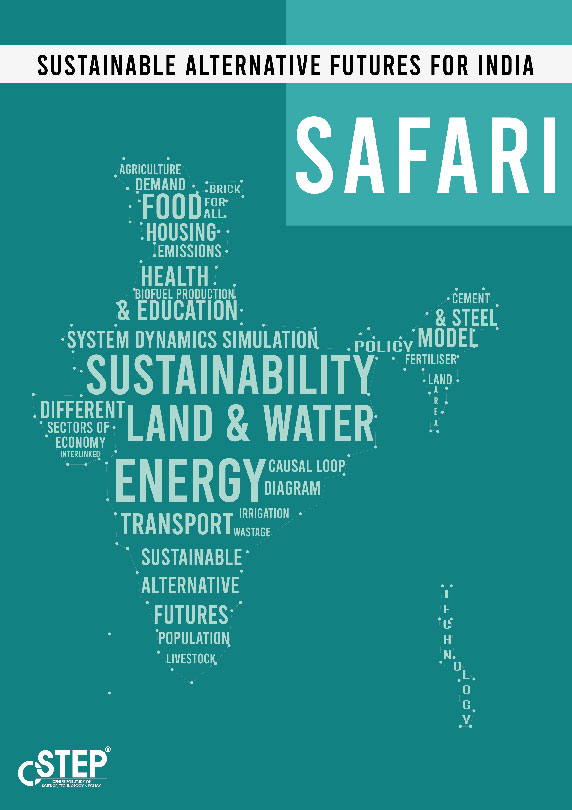Climate change mitigation involves strategies aimed at decreasing greenhouse gas emissions, promoting renewable energy sources, improving energy efficiency, and implementing sustainable practices. CSTEP focuses on building models to simulate India's future across sectors, such as transport, industries, buildings, agriculture, and forestry, to find interventions required to achieve a sustainable and secure future. Our work also involves the study of certain themes that cut across sectors (quality of life and development vs climate action, water and land demands for agriculture vs power, etc).
CSTEP's SAFARI model: Balancing development with climate action requires a good understanding of the interactions between sectors, natural resource systems, and environmental externalities. The Climate Change Mitigation at CSTEP has undertaken a modelling study with the aim to provide such an understanding and help create scenarios for low-carbon development through the use of an interactive simulation tool called Sustainable Alternative Futures for India (SAFARI). You can access the tool here.
SAFARI estimates the energy, emissions, and resources implications of achieving developmental goals such as food, housing, healthcare, education, power for all, and transport up to 2050. The user interface allows you to explore these implications as well as the trade-offs between them. Using SAFARI, you can create integrated scenarios across sectors and test out the impact of policy choices on energy, emissions, and resources. Ultimately, we hope that this tool can be used to provide insights into developing and tracking India's long-term strategy (LTS) in line with the Paris Agreement. For more information, please contact safari@cstep.in



Warming Up to Climate Action – the Transport Sector
The year 2021-22 has been a milestone year in many ways for climate action in India. While a lot more could have been done (as is always the case), the wins cannot be ignored. The highlight was of course India’s ‘net zero by 2070’ announcement at the 26th UN Climate Change Conference (COP26), along with other announcements on short-term targets for renewable energy and emissions reduction.
Think in Systems To Deliver India’s Long-term Climate Strategy
The 2015 Paris Agreement required countries to submit their long-term climate action strategies by 2020. At COP26, India made a surprise announcement of a target to reach net-zero carbon emissions by 2070, which means it will aim to balance the amount of carbon dioxide emitted with the amount absorbed.
Budget 2022: What To Look For
The year 2021 was a year of mixed fortunes. On the one hand, we witnessed India crossing 100 GW of installed renewable energy, while on the other, the pandemic took a toll on communities at large. Many of the efforts that had started at a good clip in early 2021 saw considerable slowing down mid-year due to the pandemic. The past year also had approximately 12GW of solar energy capacity installed, more than 250% compared to 2020.
Electric Vehicle Demand Projection for Bengaluru and Power Demand Management
According to data from the International Energy Agency (2020) and the Ministry of Environment, Forest and Climate Change (2018), it is estimated that more than 90% of CO2 emissions from the transport sector is from road transport. The Government of India (GoI) has taken several steps to electrify the transport sector. In 2013, India expanded its decarbonisation vision by launching the National Electric Mobility Mission Plan (NEMMP) for 2020.
India Solar Energy Market Outlook 2022
At the recently concluded 26th session of the Conference of the Parties (COP26) in Glasgow, India announced that it will raise its non-fossil energy capacity to 500 GW by 2030. Solar energy will play a key role in achieving this target.
Global Warming at Doorstep, We Need Planning with Climate Lens
Karnataka experienced floods this year - the fourth consecutive year since 2018. In the past decade, Karnataka has also experienced drought conditions.
Post-pandemic Recovery Through Landscape Restoration
Land degradation as one of the mega drivers of loss of biodiversity and ecosystem services has affected billions globally, resulting in rampant loss of livelihoods and accelerated distress migration. India, one of the land degradation hotspots in Asia, has also been reeling under the impacts of the ongoing climate and pandemic crises, which have seriously imperiled local livelihoods and human well-being.
District-Level Changes in Climate: Historical Climate and Climate Change Projections for the Eastern States of India
The impacts of climate variability, climate change, and extreme events are visible globally and in India. The Global Climate Risk Index 2021 ranks India seventh, considering the extent to which India has been affected by the impacts of weather-related loss events (storms, floods, heatwaves, etc.). The index signals that repercussions of escalating climate change are exacerbating and can no longer be ignored.
Win-win Transportation Strategies for India: Linking Air Pollution and Climate Mitigation
This article analyzes road transport in India to explore linkages between air pollution and climate change policies in the transportation sector. Five teams modeled five policy scenarios – fuel efficiency, electrification, alternative fuels, modal shifts, and moderation in transport demand – to explore which policy brings the largest synergetic effects in reducing carbon dioxide (CO2) and particulate matter (PM2.5) emissions. The teams also modeled the comprehensive scenario which included policy measures from individual scenarios.
Identification of Polluting Sources for Bengaluru – Source Apportionment Study
The Ministry of Environment, Forest and Climate Change (MoEFCC), Government of India, launched the National Clean Air Programme (NCAP) in 2019, with the aim to improve air-quality levels in non-attainment cities. NCAP has identified 122 non-attainment cities (cities that violate the national ambient air quality standards). Bengaluru, the capital of Karnataka state, is one of the non-attainment cities. In this context, the Karnataka State Pollution Control Board (KSPCB) has put forth action points for reducing the air-pollution levels in the city.